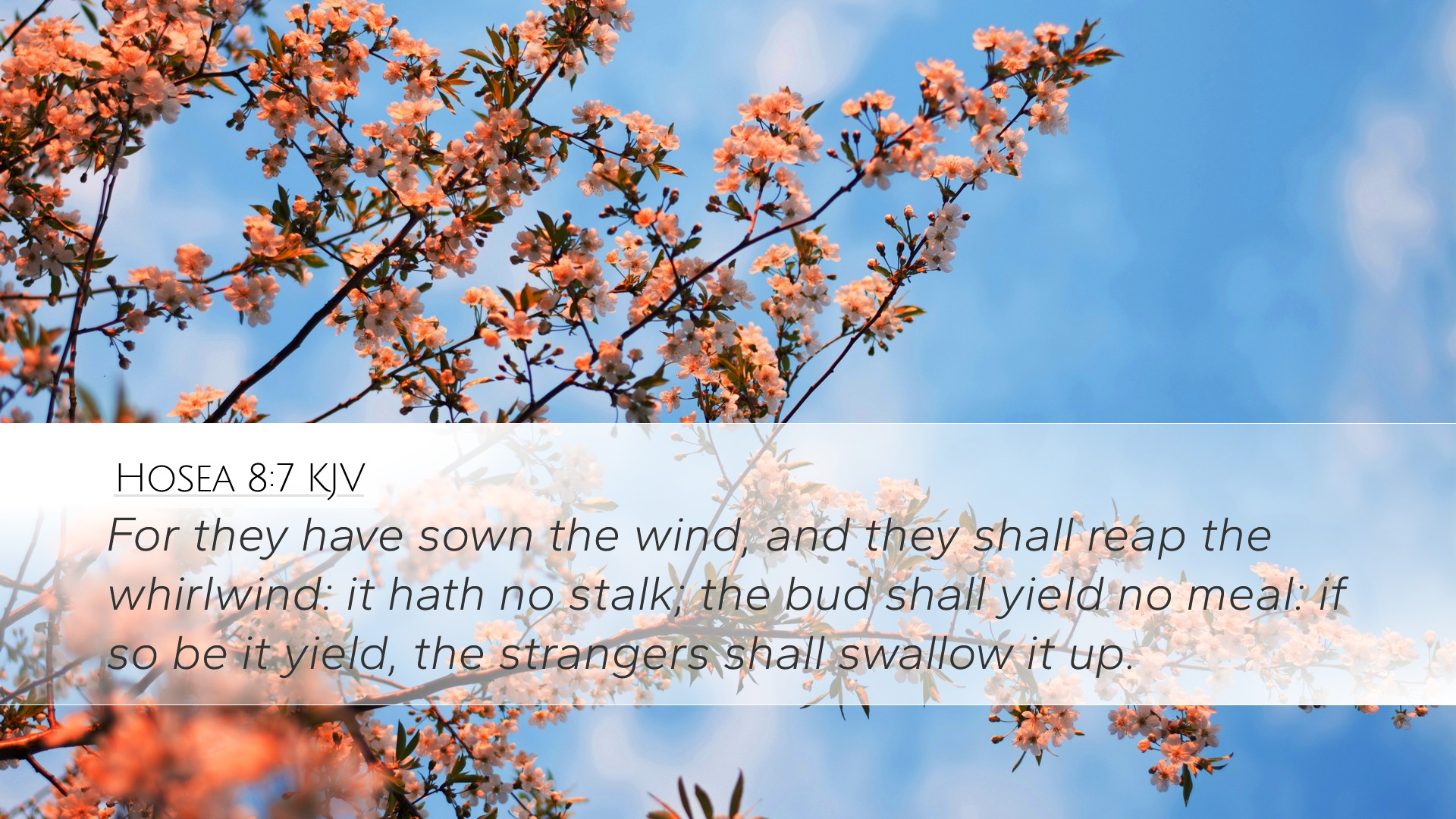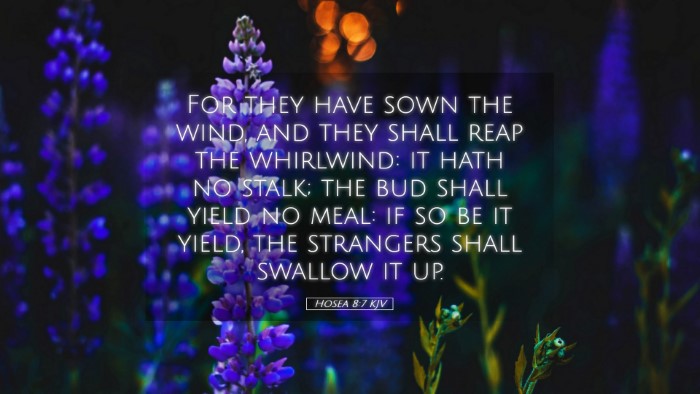Old Testament
Genesis Exodus Leviticus Numbers Deuteronomy Joshua Judges Ruth 1 Samuel 2 Samuel 1 Kings 2 Kings 1 Chronicles 2 Chronicles Ezra Nehemiah Esther Job Psalms Proverbs Ecclesiastes Song of Solomon Isaiah Jeremiah Lamentations Ezekiel Daniel Hosea Joel Amos Obadiah Jonah Micah Nahum Habakkuk Zephaniah Haggai Zechariah MalachiHosea 8:7
Hosea 8:7 KJV
For they have sown the wind, and they shall reap the whirlwind: it hath no stalk; the bud shall yield no meal: if so be it yield, the strangers shall swallow it up.
Hosea 8:7 Bible Commentary
Bible Commentary on Hosea 8:7
Verse: "For they have sown the wind, and they shall reap the whirlwind: it hath no stalk: the bud shall yield no meal: if so be it yield, the strangers shall swallow it up." (Hosea 8:7, KJV)
Introduction
The verse Hosea 8:7 offers a poignant summary of the consequences faced by the nation of Israel due to their unfaithfulness to God. The agricultural metaphor of sowing and reaping encapsulates a divine principle that extends beyond physical actions, revealing spiritual truths about the consequences of sin and moral deception. This commentary will draw insights from several public domain sources, providing depth and clarity to this complex verse.
Exegesis and Context
In the prophetic literature of Hosea, we find a recurring theme of judgment intertwined with the call to repentance. Hosea’s ministry primarily occurred during a period of spiritual apostasy in Israel, where idolatry ran rampant. Matthew Henry elaborates that the "wind" symbolizes the light and trivial pursuits that lead Israel away from their covenant with God. Thus, to "sow the wind" suggests engaging in empty and misleading practices that lack true substance.
Interpretation of Sowing and Reaping
Contextual Meaning: The metaphor of sowing and reaping is deeply rooted in the agricultural practices of the ancient Near East. Adam Clarke comments that this verse emphasizes the principle that what one plants is what one will ultimately harvest. In this case, the ephemeral "wind" will produce destructive outcomes, symbolized by the "whirlwind." The sin of Israel, primarily their idolatry and abandonment of God, leads to dire consequences, akin to harvesting chaos from careless sowing.
The Danger of Strangers
The latter part of the verse describes a dire situation where even if the crop ("bud") does yield, "strangers shall swallow it up." Albert Barnes points out that this reference to strangers suggests foreign powers who would oppress Israel as a result of their disobedience. The promise of the land and its blessings is forfeited through their rebellion, which not only jeopardizes their relationship with God but also places them under alien control.
Theological Implications
Hosea 8:7 foregrounds several theological implications that are crucial for understanding divine justice and mercy:
- The Principle of Consequence: The verse reinforces the biblical principle of consequences—actions have repercussions. The insistence on accountability speaks to the character of God as just and righteous.
- The Nature of Idolatry: By turning to idols, Israel fabricates a false security that ultimately yields nothing. The stark reality is that reliance on anything but God is futile and harmful.
- The Urgency of Repentance: Implicitly, there is an urgent call to return to obedience and true worship, which God desires for His people.
Application for Today
This verse serves as a profound reminder to modern believers about the dangers of superficial spirituality and the allure of worldly pursuits. Pastors, students, theologians, and scholars are encouraged to reflect on the following applications:
- Examine Our Sowing: What are the 'winds' we are currently sowing in our lives? Are they leading to eternal significance or temporary satisfaction?
- Consider the Consequences: In what areas of our lives have we failed to recognize the impact of our actions on ourselves and others?
- Seek Authenticity in Worship: Moving beyond mere ritualistic practices, how can we cultivate a deeper and more genuine relationship with God?
Conclusion
Hosea 8:7 encapsulates a powerful warning against the folly of idolatry and the inevitable consequences of turning away from God. Through the insights of Matthew Henry, Albert Barnes, and Adam Clarke, we gain a richer understanding of the agricultural imagery that illustrates the ultimate futility of sin. For believers today, the imperative remains clear: to be mindful of what we sow in our spiritual lives, recognizing that genuine faithfulness will yield fruitful blessings while disobedience leads to destruction.


